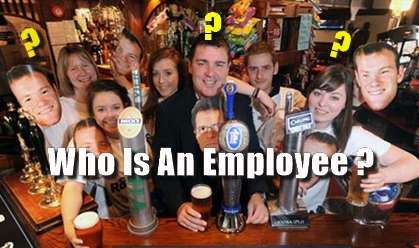Not all persons who perform work for others are employees, in the case of pretty well all pubs, your staff will be classed as employees. The tests for whether a person working in a pub is an employee are fairly simple:
The Employment Rights Act 1996 contains a number of definitions which are a useful starting point for determining employment status:
- an “employee” is an individual who has entered into or who works under a contract of employment.
- a “contract of employment” is a contract of service, whether express or implied, and (if it is express) whether oral or in writing.
The courts in the UK have reached the conclusion that the two basic components of an employment relationship are: “mutuality of obligation”, where you and your staff must be under legal obligations to each other and “personal obligation” where the obligation that falls on your staff must fall on the individual personally i.e. an employee cannot provide a substitute to do his or her job. The key factors are:
- the documentation if an individual has a written contract of employment which states that it is contract of service
- control test The more control that an employer has over an individual’s actions, the more likely the relationship is one of employment.
- ownership of equipment if an individual owns and uses his or her own equipment, he or she is less likely to be an employee than if the individual provides their own equipment (this doesn’t include cooks/chefs who bring their own knives to work for instance)
- tax if income tax and NI contributions are deducted through the employer’s PAYE scheme, the individual is likely to be an employee.
Top Tips on deciding who is an employee, such as cleaners, door staff and DJs:
- Is there a clear contract between you and the agency for the service? You should make sure there is.
- Does the agency have an actual contract of employment with the agency worker? One should always be in place. It is worth checking with the agency, if an agency doesn’t have employment contracts in place, what else are they not doing? Insurance? Risk Assessment? Training?
- Does the agency pay the worker’s wages, NI, holiday, sick pay and tax? Under no circumstance should you be making direct payments to an agency worker for the work they do for you. If this is part of the deal with an agency, walk away.
- Who controls the worker — the agency or just you? Ultimately, control should be with the agency, so it is they who decide pay. terms and conditions, hiring and firing.
- Do you allow any individual to be provided by the agency or do you demand specific staff? It is better that you leave the decision with the agency, however, there’s nothing to stop you from requesting a change in agency personnel if you are, say, dissatisfied with a particular agency worker. Your contract with the agency over the quality of the the work the agency (and their staff) do for you should allow for circumstances where you can request a change … for instance if an agency worker works in an unsafe way and despite your requests for them to work safely they fail to do so … or for instance if they are drunk on duty, steal from you etc
